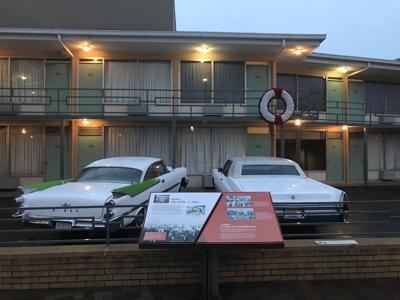Many people travel to Memphis to see a king. Some think of Elvis Presley, often called the king of Rock & Roll. Memphis, however, also was the city where Martin Luther King, Jr. gave his famed and final speech, “I’ve Been to the Mountaintop,” and where he drew his last breath.
Last year, a friend and I took my boys, Wyatt, 19, and Walker 16, on a road trip to Memphis and Tennessee.
All my life I have wanted to visit Graceland and the Ryman Auditorium.
When planning our trip, I began to research points of interest in both cities. I didn't want to miss anything.
For Memphis, Graceland was at the top of every must-see article and listing.
Other high-profile places include Sun Records, the Peabody Hotel, Beale Street, and the Bass Pro-Shop glass pyramid.
Hidden amongst the Top-15 is the National Civil Rights Museum – Lorraine Motel. As soon as I saw the listing, I knew I had to see it.
Last year, we headed to Memphis on Friday, March 8, arriving early Saturday morning. After a few hours of sleep, we got up early to explore the Mississippi bluff city.
Our first stop was Graceland. Our next stop was Beale Street, where we had what we will refer to as Tennessee BBQ, because it was nothing like we eat in the Lone Star State. A deluge of rain trapped us with a sea of other tourist in the shops that line the iconic birthplace of the blues.
It was late in the day, sun setting, as we found our way to 450 Mulberry Street, the home of the Lorraine. With closing times looming, we opted to visit only the outside and not enter into the actual museum or see the inside of the hotel room that King has stayed in.
I find it interesting that both Graceland the Lorraine Motel, shrines to kings, are engulfed by the city, hidden among homes and businesses.
In the parking lot of the hotel sits a 1968 Cadillac and 1959 Dodge, parked directly in front of Room 306, where King was staying on the day he died. A wreath adorns the balcony where King was standing when fatally shot. It replicates the one placed there on April 8, 1968, during a memorial service. The marble marker was placed on the site the same day. The cars resemble those in the parking lot on the day King was killed.
Those that took the inside tour saw the hotel room as it was the day King died.
Across the street from the hotel is the National Civil Rights Museum; on the wall of the part of the building is a mural of icons of the Civil Rights Movement.
Inside the museum are multi-media and interactive exhibits, including numerous short movies for visitors.
I found the entire experience moving.
As I took pictures and read the history plaques in the motel's parking lot, a sobering, reverence for those that died there, and those that died for the cause, came over me. I was standing on hallowed ground.
King's passionate words resound in my heart. “I have decided to stick to love….hate is too great a burden to bear,” is one of my favorite quotes.
In preparing for our trip I learned a lot about the final days of MLK. On March 29, 1968, King went to Memphis to support black sanitary public works employees, represented by the AFSCME Local 1733.
King’s flight to Memphis was delayed by a bomb threat against his plane.
The workers had been on strike since March 12, 1968, for higher wages and better treatment.
On April 3, King addressed a rally, delivering his famed “I’ve Been to the Mountaintop” address at Mason Temple, the world headquarters of the Church of God in Christ. In what would be his last speech, King referenced the bomb threat. In this prophetic address, he said:
“And then I got to Memphis. And some began to say the threats, or talk about the threats that were out. What would happened to me from some of our sick white brothers?
Well, I don’t know what will happen now. We’ve got some difficult days ahead. But it doesn’t matter with me now. Because I’ve been to the mountaintop. And I don’t mind. Like anybody, I would like to live a long life. Longevity has its place. But I’m not concerned about that now. I just want to do God’s will. And He’s allowed me to go up to the mountain. And I’ve looked over. And I’ve seen the promised land. I may not get there with you. But I want you to know tonight, that we, as a people, will get to the promised land. So, I’m happy, tonight. I’m not worried about anything. I’m not fearing any man. Mine eyes have seen the glory of the coming of the Lord.”
During his stay in Memphis, King and his fellow civil rights crusader, Ralph Abernathy, stayed in Room 306 at the Lorraine Motel, owned by Walter Bailey. King, Abernathy, and their entourage stayed in this room so often that is was known as the King-Abernathy suite.
Jesse Jackson, who was present, said King’s last words on the balcony before his assassination were to musician Ben Branch.
Branch was scheduled to perform that night at an event with King. Jackson recalls King telling Branch, “Ben, make sure you play ‘Take My Head, Precious Lord’ in the meeting tonight. Play it real pretty.”
King was fatally shot by James Earl Ray at 6:01 p.m. on April 4, 1968, as he stood on the motel’s second-floor balcony. The bullet entered through King’s right cheek, smashing his jaw, it then traveled down his spinal corn and lodged in his shoulder.
King died at St. Jospeh’s Hospital at 7:05 p.m. after emergency chest surgery.
Ray fled, driving 11 hours to Atlanta and then to Toronto, Canada three days later. He hid there for over a month, acquiring a passport under the false name Ramon George Sneyd. He left Toronto in late May, on a flight to England. He stated briefly in Lisbon, Portugal and then returned to London.
He was finally arrested on June 8, 1968, two months after King’s death, at Heathrow Airport in London, attempting to fly to Brussels.
Ray was convicted on his 41st birthday after entering a guilty plea to forgo a jury trail and was sentenced to 99 years in prison for the murder of King. Had he been found guilty by a jury, he would have been eligible for the death penalty. He died in 1998 at the age of 70, after serving 29 years. He would have been eligible for parole in 2018.
The Lorraine Motel became a symbol for the civil rights movement. In 1982, a local non-profit group saved the site form foreclosure for use as America’s first civil rights museum. It was renovated to its current state in 1991.
If you get the opportunity to visit the Lorraine, do so. It costs nothing to stand outside the hotel and view the spot where a great man was taken from this world too soon, with too much left to do.
King paved the way to the promised land with everything he had.






Commented
Sorry, there are no recent results for popular commented articles.